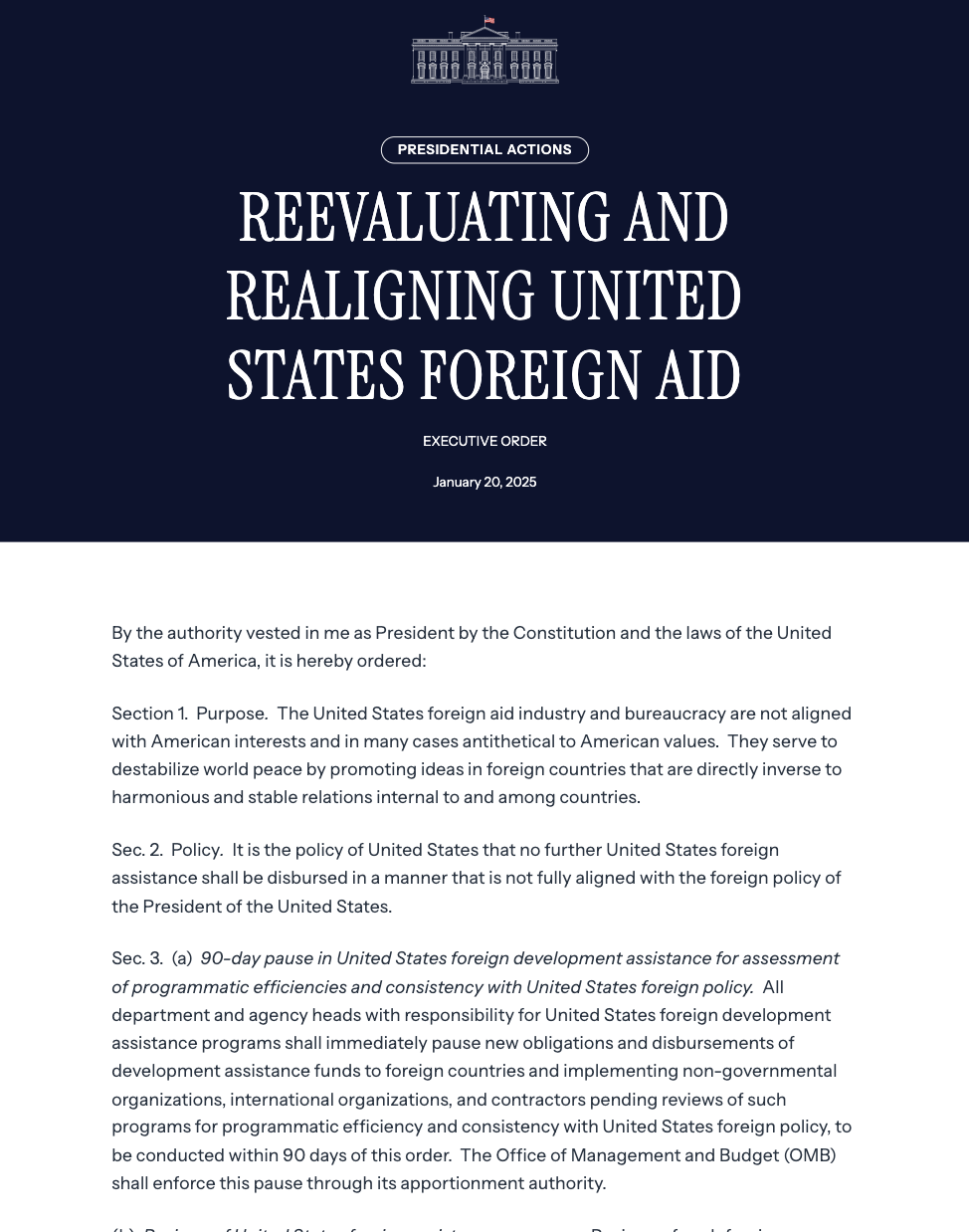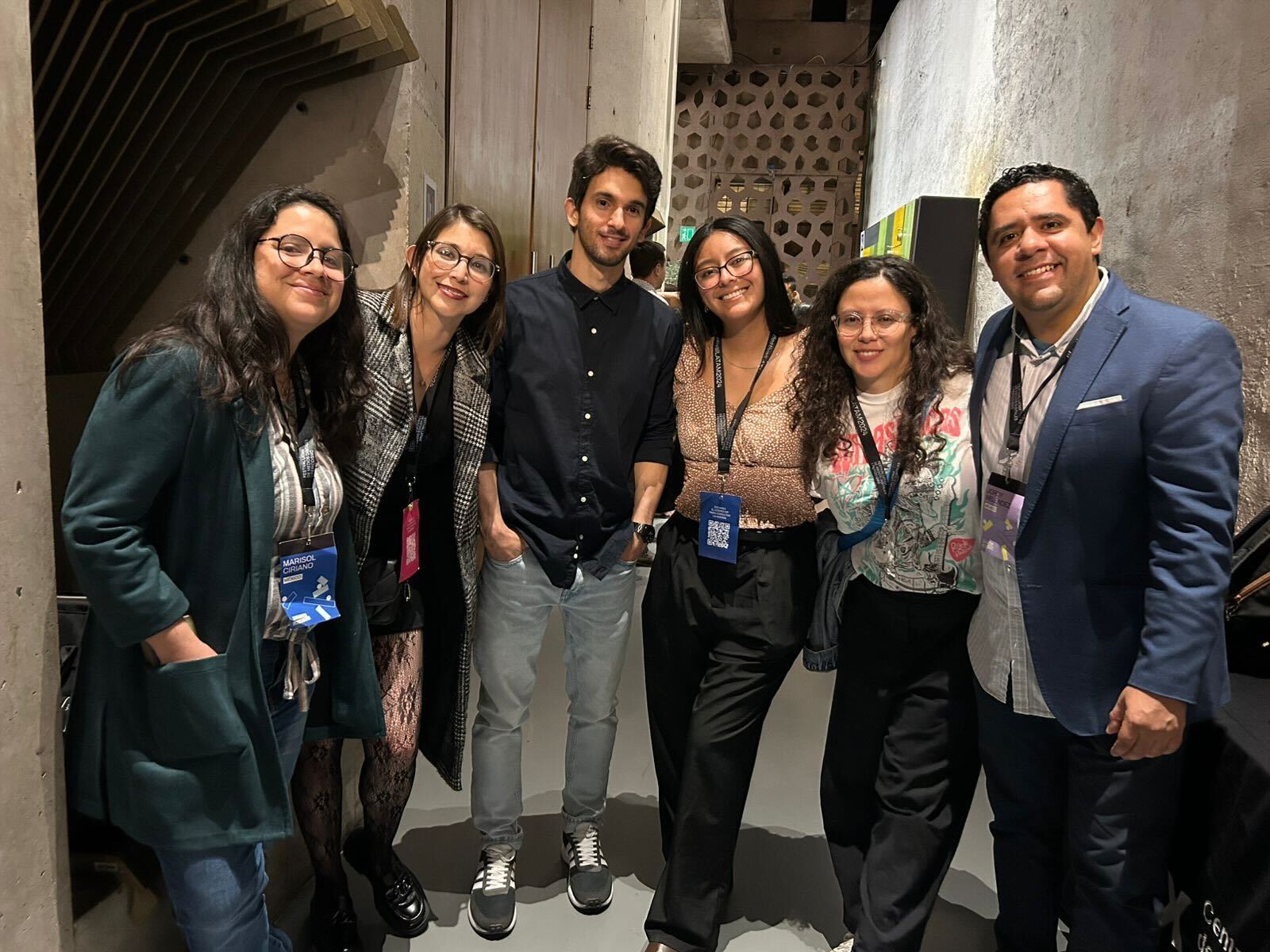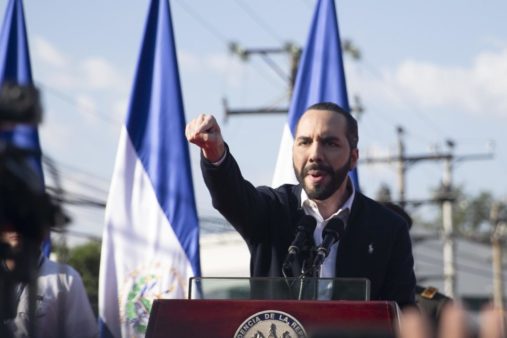When U.S. President Donald Trump signed an executive order for the freeze of foreign aid, news organizations in Latin America felt the effects almost immediately.
“The impact is severe for almost all media in Latin American ecosystems that work with these models that are not necessarily based on advertising or subscriptions,” José Jasán Nieves, director of Cuban digital media outlet El Toque, told LatAm Journalism Review (LJR). “We are going to see many media outlets closing down and being unable to continue operations, even if U.S. funding were to resume.”

Trump's executive order freezes international aid programs that rely on U.S. funding for 90 days. (Photo: Screenshot from the White House website)
The order, signed on Jan. 20, freezes international aid programs that rely on U.S. funding for 90 days. That includes more than $268 million that had been allocated by the U.S. Congress to support independent media and programs promoting the free flow of information around the world through 2025, according to data from Reporters Without Borders (RSF, for its initials in French).
Faced with the high probability of having to reduce their teams, cancel projects or even disappear, independent media outlets in Latin America are seeing the importance of diversifying their sources of income more clearly than ever.
Some of them have already started to implement strategies to mitigate the impact of the suspension, such as reorganizing priorities, speeding up projects and launching crowdfunding campaigns.
Nieves said that business models such as membership programs, audience support or third-party services have been secondary for most media that do investigative or civic journalism. The predominant model in this type of media, he said, has been financing through grants from organizations or international cooperation.
In recent years, El Toque had been working to reduce its dependence on that type of financing through a revenue diversification strategy, Nieves added.
As a result, the media outlet expects the suspension of support from U.S. entities to impact 50 percent of its annual budget, unlike other independent media outlets in Cuba, which depend up to 100 percent on these funds, he said.
“In the Cuban media ecosystem, diversification of funding was not a topic that was treated seriously,” Nieves said. “U.S. cooperation seemed so solid and so untouchable, and annual funding has remained fairly stable for a long time, that I think many people didn’t really think they needed to diversify.”
Patricia Mercado, founder and director of Conexión Migrante, one of the Mexican digital native media outlets affected by the suspension of funding, said one advantage her newsroom has is that its sources of income are more or less diversified.
Since, in addition to international funding, they also have income from donations and services to third parties, such as communication campaigns, the impact of Trump's order will affect their organization by 20 percent of its income, Mercado said.
However, the suspension has prompted the newsroom to reflect on how dangerous it is for independent media to depend on international aid. Because, she said, the same thing that is happening with US funds could happen with support from any other country or organization.
“I have heard this discussion about how much one should depend on grants for a long time. And this is the first example we have of what can happen [because of that dependence],” Mercado said. “It is really cool when they tell you ‘next year I will give you $200,000.’ You get a little comfortable and say ‘I have it figured out.’ Not necessarily.”
The U.S. foreign aid freeze is creating chaos globally and will have a serious impact on journalism, said Clayton Weimers, director of the RSF North America office, in a Feb. 4 press release.
In 2023 alone, support from the United States Agency for International Development, or USAID, benefited 6,200 journalists, 707 non-state news outlets and 279 organizations dedicated to strengthening independent journalism around the world, RSF said.

The Factual/Distintas Latitudes team. Its director, Jordy Meléndez, (right) said that the funding freeze directly affects one of their main programs. (Photo: Courtesy Factual/Distintas Latitudes)
Even media outlets best prepared for the impact of the suspension anticipate strong effects on their operations. For El Toque, the loss of those funds could mean reducing its current staff from 30 to fewer than 10, Nieves said.
Conexión Migrante will have to partially suspend at least two initiatives to reach its audience, including a video project with useful content for migrants that was part of the media outlet's plan to face the coverage challenges that come with Trump's immigration policies.
Regional journalism platform Factual-Distintas Latitudes will stop receiving funds that represent 30 percent of its annual budget, its co-director Jordy Meléndez told LJR.
Although the organization has other sources of income, the suspension directly impacts one of its main programs: the LATAM Network of Young Journalists. In 10 years of existence, the network has identified, trained and promoted the talent of almost 450 journalists from across the region.
Meléndez said that while he expects the current generation of the network to develop smoothly, he is not entirely certain that there will be a tenth generation of the program.
“Funds from a U.S. cooperation agency financed that specific project, which is really the heart of everything Factual does,” Meléndez said. “All the other projects we have today are somehow linked to or dependent on the LATAM Network.”
Trump's order calls for a 90-day suspension of foreign aid to conduct a review of the programs' alignment "with United States foreign policy." The document says the programs could be reactivated after such a review.
There is a possibility that the suspension could be challenged in the U.S. courts, since the funds are allocated by the U.S. Congress and many of them are destined for programs on which human lives depend, said Laura Dib, director of the Venezuela program at the Washington Office on Latin America (WOLA).
“This is money that had been appropriated by Congress and therefore it is up to Congress how this money is used,” Dib told LJR. “Although it is not only for humanitarian purposes. There are funds that are allocated to programs related to democracy, human rights, access to information and support for independent journalism.”
However, journalists are pessimistic that the programs will be reinstated after the 90-day period, so many of them are already looking for funding from other countries and organizations. Dib said that although there are programs to support independent journalism in some European countries, these are also undergoing changes.
“Europe is going to have to fill certain gaps, which is also worrying because there are countries in Europe that are also rapidly moving to the right and closing down their programs that have to do with human rights and democracy,” Dib said. “This also puts organizations in a very difficult situation in which they will have to compete with each other for resources.”
Private organizations that had long been known for their support of global journalism, such as the Open Society Foundations, the Knight Foundation and the Ford Foundation, are also shifting their priorities and reducing or closing their funding programs, Nieves said.
Added to this are the recent closures of initiatives to support journalism by technology giants, such as Facebook's program to pay media outlets for content, or the closure of its fact-checking program, which, although it does not currently apply in Latin America, is causing concern among journalists in the region.
Journalists agree that the outlook is quite bleak.
“With all these factors in place, you have to understand that this is not a temporary situation and that we are facing a mass media extinction event,” Nieves said. “I think that if [US funding] returns, it will be under different conditions and by then the damage may already be very deep.”

Conexión Migrante will seek to reinforce the donation campaign launched in December, called “Dona una Dona” ("Donate a Donut"). (Photo: Screenshot)
RSF noted that many organizations in countries with authoritarian regimes have avoided making public the impact of the funding freeze for fear of jeopardizing their long-term funding or becoming targets of reprisals.
A journalist who asked to remain anonymous and who heads a group of media outlets working together in her country told LJR that at least half of these outlets could close within three to six months.
Mercado, for her part, predicts that newsrooms that do not disappear will be forced to reduce their size and capabilities.
“What is happening is a change in the dynamics of many organizations. Many will disappear, others will be able to resist,” she said. “We may become smaller, but there are organizations that will not even be able to do that.”
On Feb. 7, the Global Investigative Journalism Network (GIJN) called on US authorities to reverse the suspension of foreign support.
In a statement from its Board of Directors, the organization said that eliminating these funds means that investigative journalism outlets in all regions of the world will be hindered or completely unable to continue their reporting.
Since Trump's order was announced, El Toque, Conexión Migrante, Distintas Latitudes and other independent media outlets from countries with authoritarian regimes that requested anonymity began knocking on other doors to potential sources of funding through grants and funds.
However, they all know that securing new support will take time and that it will be almost impossible to fill the void left by US international cooperation. Therefore, in order to best withstand the impact, these media have already begun to apply other types of measures focused on reorganizing priorities and capacities, and trying to generate new self-financing strategies.
Some decided to bring forward projects they had planned for this year or accelerate others already started to bring them to a point where they can be monetized. El Toque, for example, will seek to accelerate its consolidation as a media outlet in exile and develop pilot news products that serve the Cuban diaspora in the United States.
“These communities have specific and concrete information needs, and they are usually better off economically than the people in the country they left,” Nieves said. “These are strategic lines of work that we had this year and right now what we have done is step on the accelerator, to fight against the clock and bring out products that we had planned to do more slowly.”
As soon as the newsroom at Conexión Migrante was notified of the suspension of support, Mercado asked her audience for help and to reinforce the donation campaign they launched last December. The journalist said that, with some adjustments to their budget, the donations they have received and income from sources other than grants, the media outlet will be able to maintain its full team at least until March.
Mercado hopes that at least her team can build the foundations for the video channel project with content for migrants, so that it can be resumed when the situation improves.
“The trick is to endure this first quarter because we know that in April and May we will have communication campaigns and many of the things we are doing,”s he said. “Instead of taking a very long step, which was what we were going to do, we will take small steps to build what we had planned for 2025.”
For his part, Meléndez said that Factual/Distintas Latitudes is currently in the process of internal reorganization to establish a rapid response strategy to the cuts. This includes advancing the development of two publications that they planned to launch later in the year, one consisting of essays on the present and future of journalism written by young journalists, and another of a Latin American poetry anthology.

Salvadoran president Nayib Bukele accused the USAID-funded media of being part of a money laundering network. (Photo: Courtesy El Faro)
The outlet will soon launch a crowdfunding campaign that hopes to raise at least $10,000. The aforementioned editorial products will be part of the rewards for donors, Melendez said.
The organization also began seeking sponsorships and alliances for the 14th edition of the LATAM Digital Media and Journalism Festival – another of its flagship projects, from which it receives 30 percent of its budget. It will be held in November in Mexico City.
“Not only do we have to diversify, but we have to continue thinking about how our journalistic products have a value that is attractive to people,” Meléndez said. “We have to be able to create valuable or educational projects that have a high value in themselves and that people are willing to invest in.”
Nieves and Mercado agree that media outlets in countries with authoritarian governments where it is more difficult to find other sources of income can begin by diversifying the source of the donations they receive and avoiding, as far as possible, depending on a single funding organization.
“We can see projects that depended on 100 or 90 percent of their budgets from a single donor,” Nieves said. “We [at El Toque] have tried to move away from that, and that is why our impact is not 90 or so percent of the budget, but 50 percent.”
Venezuela’s Nicolás Maduro and El Salvador’s Nayib Bukele are some Latin American leaders who in recent days have agreed with the suspension of financing from United States agencies to independent media. They and other leaders in the region have repeatedly alleged that the journalistic work resulting from this support responds to US interests and seeks to destabilize.
In February, Maduro accused some digital media that receive financing from international cooperation of creating “parallel realities” and manipulation in Venezuela.
Bukele said days later that the majority of independent media financed by organizations linked to USAID promote a “globalist agenda” and are part of a global money laundering network.
Presidents and former leaders of Cuba, Nicaragua, Mexico and Ecuador have launched similar criticisms.